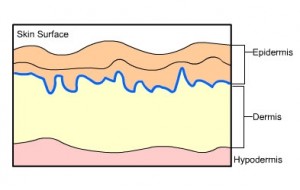Why Vitamin C Should be a Primary Ingredient in your Skin Care Products

Photo by Brooke Lark on Unsplash
Vitamin C is a water-soluble vitamin, meaning that your body does not store it. You must obtain this powerful antioxidant from food, including citrus fruits, broccoli, and tomatoes or a Vitamin C supplement on a daily basis. It is very important for overall health, but for those who are on the look out for skin care products, it should be one of the primary ingredients. Here’s why.
Vitamin C and Collagen
Everyone wants to turn back the clock when it comes to the appearance of their skin. Time, gravity and the sun are the factors to blame when skin starts to wrinkle, sag and lacks a youthful glow. We slather on expensive creams, avoid the sun like vampires, and some even resort to cosmetic surgery to get the skin they want. Many find their skin appearance does not match how they feel inside. But it’s possible that they do not know a lot of those visible changes have to do with a decline in a single valuable structural protein called Collagen. Collagen is the most abundant protein in our bodies and is found in our bones, skin, nails, muscles, tendons and ligaments; 30% of our body is made out of Collagen, including 70% of our skin, 36% of our bone tissue, and 67% of the cartilage in our joints.
However, in order to convert protein into collagen, you need adequate levels of Vitamin C.
Vitamin C (Ascorbic Acid)
Vitamin C, also known as Ascorbic Acid, has superior antioxidant properties, making it a vital molecule for skin health. According to Oregon State University’s, Linus Pauling Institute, there are three major benefits that Vitamin C provides for your skin –
Photoprotection
“Vitamin C limits the damage induced by ultraviolet (UV) light exposure. Its antioxidant activity products UV-induced damage caused by free radicals. Using skin care products that contain Vitamin C may result in greater photoprotection due to the direct route of administration. Everything you put on your skin gets absorbed into your body. This was shown in a mouse study, where topical application of ascorbic acid delayed the effects of chronic high-dose UVB exposure on the skin, including a reduction in skin wrinkling.”[1]
Photodamage/Wrinkling
“Oxidative damage, including free radicals, can lead to changes in the structure of your skin. Vitamin C’s job is to regulate the synthesis of collagen, which is necessary to the stability and support of healthy skin. In numerous clinical studies, Vitamin C has been shown to stabilize Collagen mRNA, thus increasing collagen protein synthesis for repair of the damaged skin. The use of Vitamin C in topic applications for at least 12 weeks has been shown to decrease wrinkling, reduce protein fiber damage, decrease apparent roughness of the skin, and increase production of collagen. Topical Vitamin C has also been shown to reverse some of the age-related structural changes in the interface between the dermis and the epidermis.”[2]
Dry Skin
“Higher intakes of Vitamin C have been correlated with a decreased risk of dry skin, suggesting that ascorbic acid may have effects on the skins hydration. One study using topical vitamin c in human subjects correlated its use with decreased skin roughness.”[3]
Skin Care Products
Sixty percent of what you apply on your skin gets absorbed into your body and into your bloodstream. Be sure you are only using natural products when it comes to the health of your skin! Stay away from products that contain BHA, Dibutyl phthalate, parabens, fragrances and sodium laureth sulfates.
Vitamin C, vitamin A, Green Tea, aloe vera, shea butter, mango butter are natural and safe ingredients that have been shown in numerous clinical trials to both protect your skin and give it that youthful glow you’ve been looking for!
[1] http://lpi.oregonstate.edu/mic/health-disease/skin-health/vitamin-C#reference13
[2] http://lpi.oregonstate.edu/mic/health-disease/skin-health/vitamin-C#reference22
[3] http://lpi.oregonstate.edu/mic/health-disease/skin-health/vitamin-C#reference21
